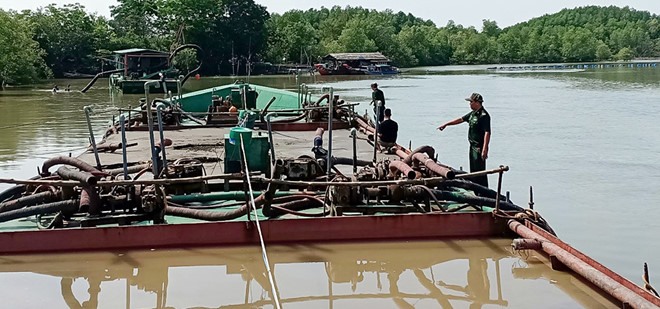 Society
Society

At midnight on a night in early January, around 50 barges bearing number plates from northern provinces were mining sand outside of Cần Giờ Sea, HCM City.
 |
| Border guard soldiers inspect a sand mining barge. — Photo thanhnien.vn |
HCM CITY – At midnight on a night in early January, around 50 barges bearing number plates from northern provinces were mining sand outside of Cần Giờ Sea, HCM City.
Carrying hundreds of pumping pipes, these barges looked like a school of octopuses from afar.
After a year of being chased by police and the border guard, the gang started mooring on smaller branches of rivers and operating at night instead of in daylight.
When they finish their illegal mining for the night, to hide from law enforcement agencies, they go to HCM City and Long An Province via the Soài Rạp, Gò Gia and Đồng Tranh rivers.
They also cover their number plates or use fake plates to avoid being caught by police.
H, a fisherman on the sea who spoke on the condition of anonimity, told Thanh Niên (Young People) newspaper that this season’s northeast wind, enormous waves and bad weather were favourable conditions for illegal miners to commit violations.
“At night, when pumping sand and moving, those ‘octopuses’ barely have lights on to keep them undiscovered,” said H.
“Aggressive miners will chase and threaten anyone daring to record their activities,” he said.
The barges had previously been seen on Cần Giờ Sea by fishermen from the city of Vũng Tàu.
HCM City Police and Border Guard, who are in charge of managing sea and river areas around the city, said it was hard to keep them under control.
‘The octopus army,’ as the group of miners and their barges is called, always resist being inspected.
Since 2018, HCM City Waterway Traffic Police (PC08B) has uncovered many illegal sand mining cases and seized some barges.
On August 22, 2018, for example, PC08B arrested an ‘octopus’ barge numbered HP4291 carrying some 1,000cu.m of sand on Tranh River without any certificate of origin.
On September 14 and 19 last year, they seized four barges with more than 2,000cu.m of sand on their way from Cần Giờ Sea to HCM City.
According to the force, miners have many different tactics to deal with police, including faking documents of origin. Most of these barges are from northern provinces. When stopped for inspection, the captains always try to avoid admitting their violations and argue when detected.
Meanwhile, the co-operation between HCM City and surrounding localities in tackling the crime has remained ineffective.
No use
Just one kilometre away from Bến Đá Border Guard Station in Vũng Tàu, several illegal mining barges are moored.
Their ‘octopus tentacles’ can be seen clearly from Sao Mai port opposite the station.
At twilight, these barges push towards Cần Giờ Sea.
To tighten management over sand mining in the area, HCM City Border Guard has proposed the city authorities set up checkpoints and equip soldiers with modern equipment.
“Checkpoints help us to reduce distance and time to approach illegal miners and prevent smuggling and illegal natural resources exploitation,” said a representative of the city’s border guard.
Brigadier Phan Anh Minh, deputy director of HCM City Police, said that most of the sand used for ground levelling in the city was illegally mined, even in state-invested construction projects.
Sand mines in the South can only satisfy up to 40 per cent of demand.
In 2018, nearly 60 cases of illegal sand mining and transporting were found by PC08B and the city border guard. In 2017, there were 37 cases.
‘The octopus army’ on Cần Giờ Sea keeps growing, allowing illegal sand mining to continue.
The status quo urges HCM City and other provinces to enforce stricter punishments for miners while preventing the violation from being committed altogether.
According to Nguyễn Toàn Thắng, director of the city’s Department of Natural Resources and Environment, city authorities have asked 19 other southern provinces to co-operate in managing sand mining and planning legal sand mines.
TĐV, who works in the ground levelling business in HCM City, recommended the authorities tighten management of construction projects as each one needs a certain amount of sand.
"There are a lot of loopholes in taxing sand,” he said. “Therefore, most miners find many ways to avoid paying taxes." – VNS




